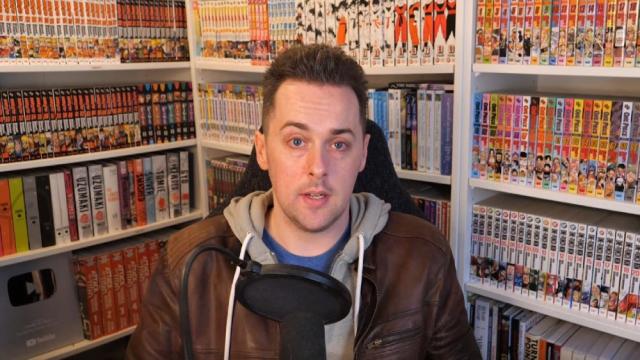YouTuber Mark Fitzpatrick of Totally Not Mark has made a name for himself with his manga and anime videos on YouTube. His reviews edit together montages from whatever he’s reviewing or critiquing as he expounds his thoughts in voice over. Mark says his use of copyright material is fair. Toei Animation, it seems, disagrees.
“Over the last twenty-four hours, I’ve sat back in disbelief, shock, and sorrow as my life’s work has been unfairly ripped away from me,” begins Mark in his response video to Toei and YouTube, which, as of writing, has over 400,000 views.
https://www.youtube.com/watch?v=WaeqXWzaizY
Totally Not Mark is a popular anime YouTuber, with well over half a million subscribers. He has concentrated on Dragon Ball, but here are other examples of Mark’s reviews:
“Two nights ago, I received an email notifying me that fifteen of my videos had been copyright claimed and block by Toei Animation,” Mark continues. “One hour later, that number rose to twenty-eight. And when I woke up this morning, it had reached a total of 150 videos that my audience can no longer see and that I can no longer monetise.” All the videos in question were either for Dragon Ball or One Piece, both of which Toei animates. Note that a handful of those videos did not feature any anime clips, but rather, were how-to-draw explainers.
For context, Mark explained that because he and his team work on one video a week, the block 150 videos are equal to nearly three years worth of work. “And as a result, the main source of my company’s income is now gone,” said Mark, adding that he has a family to provide for and employees to look after. Those are certainly valid and immediate concerns.
According to Mark, he says that he ensures that he and his employees adhere to policy regarding fair dealing and fair use as outlined by YouTube, his own country, and other countries. This maybe true; however, copyright law in Japan is…different. I’m no lawyer, but as attorney Keiji Sugiyama explained in a presentation at Fordham University, Japanese copyright law does not have a general fair use provision like the United States.
Instead, Japan has moral rights for any type of work. (Sugiyama notes that while the Japanese Copyright Law does lack a general fair use provision, there are certain legal cutouts to allow for parody and private use as well as for reproductions for schools and libraries. Cited reproductions in articles on current events are also permitted.)
According to Sugiyama, Japan’s moral rights are as follows:
Art. 18
The author shall have the rights to offer to make available to the public his work which has not yet been made public.
Art. 19
The author shall have the right to determine whether his true name or pseudonym should be indicated as the name of the author.
Art. 20
The author shall have the right to preserve the integrity of his work and its title against any distortion, mutilation or other modification against his will.
The last point is important. In Japan, the author has a tremendous amount of control over how their work is presented. So, conceivably, if an author doesn’t want their work shown in a certain way — say, on YouTube — then, they would apparently have legal standing in Japan to contest that. Looking closer at the law, it’s evident that authors have vast control over how their work is reproduced, presented, transmitted, adapted, and exhibited.
The rights of the copyright holder are so strong in Japan that it often hinders the re-release of old games, which is why proposed legislation has looked to rectify that specific problem.
As for Mark’s, the issue here would be which country’s copyright law applies and the way YouTube handles copyright claims. Some of Mark’s supporters say that the video platform’s copyright system is broken. Maybe it does need an overhaul, and maybe there should be more leeway for YouTube creators.
“The lack of fair use provision makes the interpretation of the [Japanese Copyright] Act very rigid,” says attorney Sugiyama, “and sometimes may lead to unfair results.”
